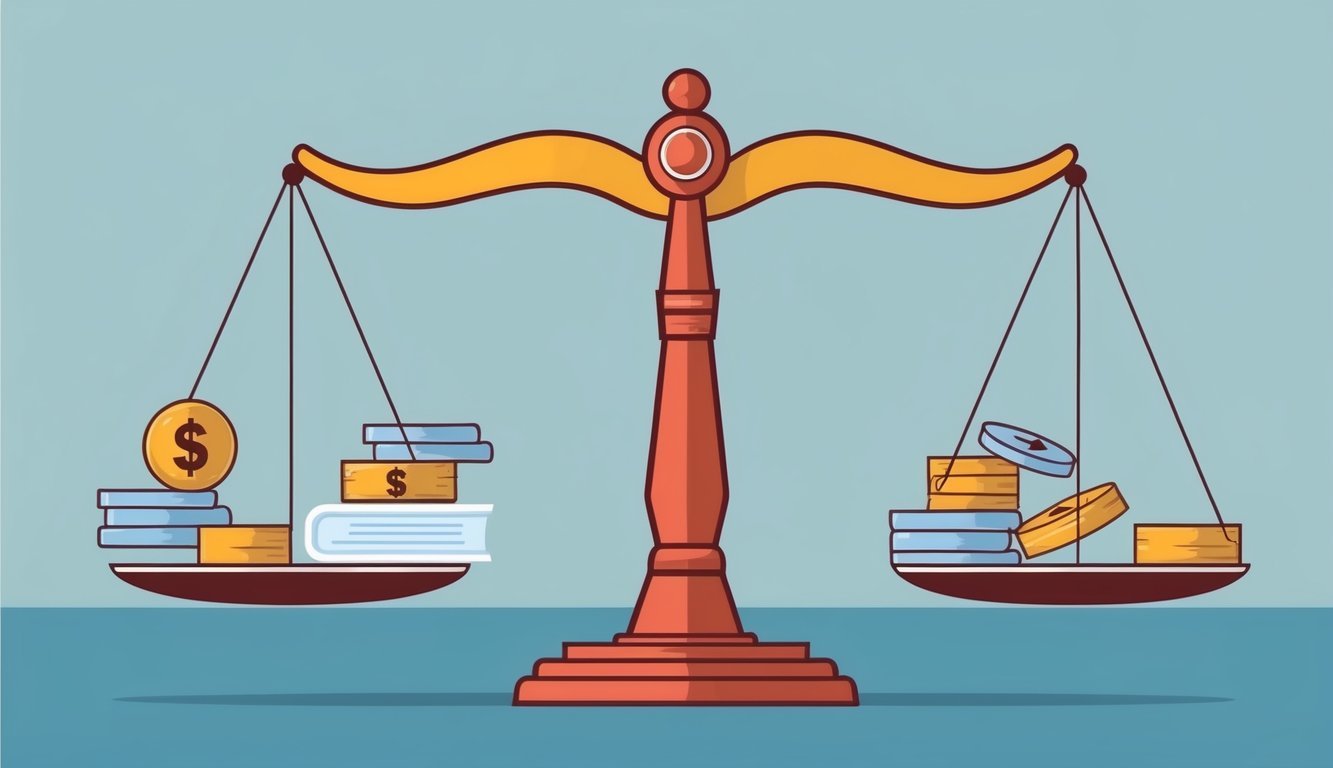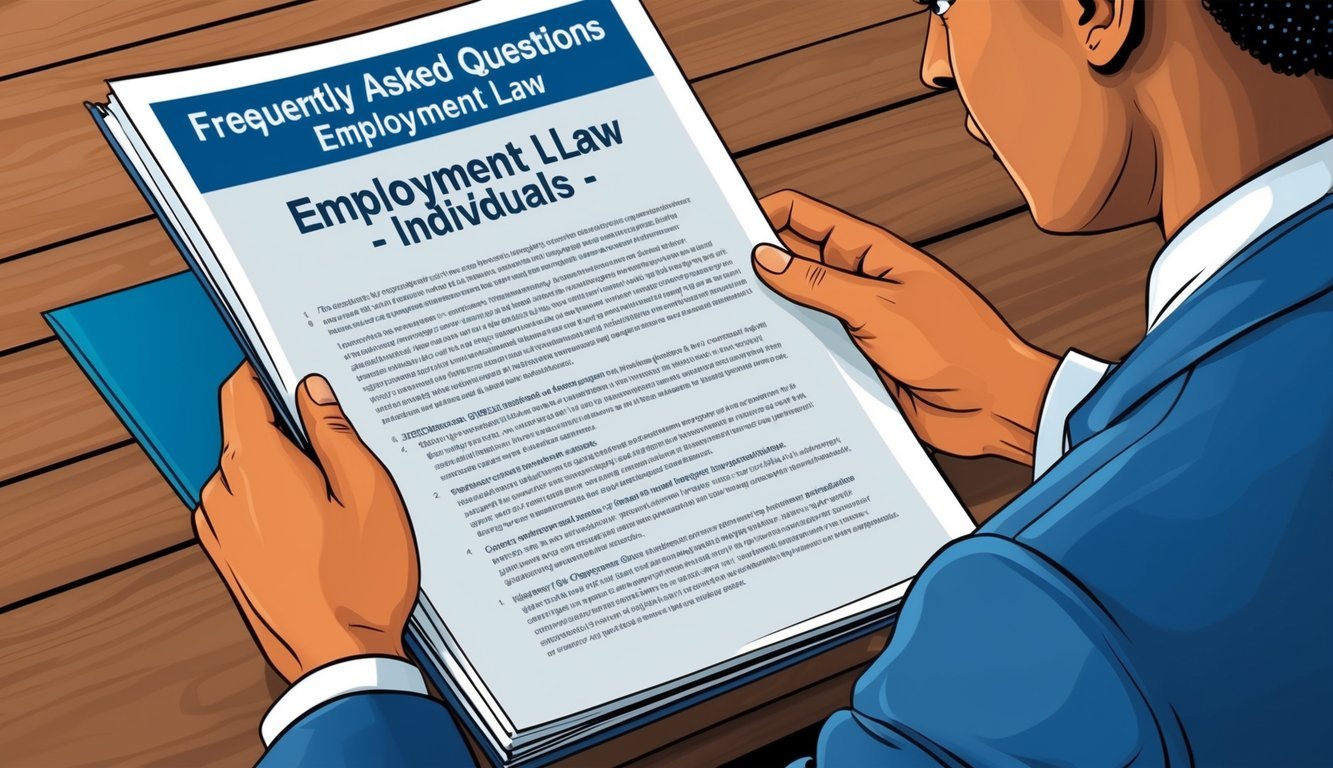Employment law safeguards your rights and well-being in the workplace. It encompasses a wide range of protections, from fair wages to safe working conditions. Understanding your legal rights as an employee empowers you to advocate for yourself and ensure fair treatment.
Navigating the complexities of employment law can be challenging. You may encounter issues related to discrimination, workplace safety, or wage disputes.
Knowing where to turn for help and how to assert your rights is crucial in these situations.
Employment regulations vary by location and industry. Staying informed about the specific laws that apply to your situation is essential. This knowledge can help you recognize potential violations and take appropriate action to protect your interests in the workplace.
Key Takeaways
- Employment law protects your rights and establishes standards for fair treatment at work
- Familiarizing yourself with relevant regulations helps you identify and address workplace issues
- Seeking professional guidance can be valuable when navigating complex employment matters
Fundamentals of Employment Law
Employment law establishes the rights and responsibilities of both employers and employees. It covers key aspects of the employment relationship, from hiring to termination, and sets standards for fair labor practices.
Understanding Employment Relationships
Employment relationships form the foundation of labor law. As an employee, you have certain rights protected by federal laws. These laws define the nature of your relationship with your employer.
Key elements include:
- Employment contracts
- At-will employment
- Independent contractor status
The Department of Labor enforces many of these regulations to ensure fair treatment in the workplace.
Understanding your classification is crucial. It determines your eligibility for various protections and benefits under labor laws.
Key Principles of Labor Standards
Labor standards are the cornerstone of employment law. They establish the minimum requirements employers must meet to ensure a safe and fair work environment for you.
Critical areas covered include:
- Minimum wage and overtime pay
- Workplace safety and health
- Anti-discrimination protections
- Family and medical leave
The Civil Rights Act of 1964 prohibits discrimination based on race, color, religion, sex, or national origin. This landmark legislation shapes many of today’s workplace policies.
You have the right to a work environment free from harassment and discrimination. Employers must comply with these standards or face potential legal consequences.
Rights and Protections for Workers
Employment law provides crucial safeguards for employees in the workplace. These protections encompass areas such as discrimination, wages, and safety to ensure fair and ethical treatment.
Discrimination and Civil Rights
Civil rights laws prohibit discrimination based on protected characteristics. You are protected from unfair treatment due to your race, color, religion, sex, national origin, age, disability, or genetic information. The Equal Employment Opportunity Commission enforces these laws.
Employers must provide reasonable accommodations for disabilities and religious practices. You have the right to work in an environment free from harassment and retaliation.
If you face discrimination, you can file a complaint with the EEOC. Document any incidents and follow your company’s reporting procedures.
Wage and Hour Regulations
The Fair Labor Standards Act establishes minimum wage and overtime pay standards. You are entitled to receive at least the federal minimum wage for all hours worked. Currently, this is $7.25 per hour, though many states have higher rates.
For overtime, you must receive 1.5 times your regular rate for hours worked beyond 40 in a workweek. Some employees are exempt from overtime rules based on their job duties and salary level.
Keep accurate records of your hours worked. If you believe your employer has violated wage laws, you can file a complaint with the Department of Labor’s Wage and Hour Division.
Workplace Safety and Health
The Occupational Safety and Health Act requires employers to provide a safe work environment. You have the right to:
- Receive safety training in a language you understand
- Work on safe machines
- Be provided necessary safety gear
- Report unsafe conditions without fear of retaliation
OSHA conducts workplace inspections and investigates safety complaints. If you notice hazardous conditions, report them to your employer. You can also file a confidential complaint with OSHA if the issue is not resolved.
Your employer must keep records of work-related injuries and illnesses. You have the right to access these records and report incidents without retaliation.
Employment Discrimination Law

Employment discrimination law protects individuals from unfair treatment in the workplace. It covers various forms of discrimination and provides mechanisms for enforcement.
Prohibited Discriminatory Practices
You are protected from discrimination based on race, color, religion, sex, national origin, age, disability, and genetic information. The Civil Rights Act of 1991 strengthened these protections and expanded remedies for violations.
Employers cannot discriminate in hiring, firing, promotions, or any other terms of employment. This includes using discriminatory criteria in job postings or during interviews.
You have the right to equal pay for equal work, regardless of gender. Pregnancy discrimination is also prohibited, ensuring expectant mothers are treated fairly.
Harassment in the Workplace
Harassment is a form of discrimination that creates a hostile work environment. You are protected from unwelcome conduct based on protected characteristics.
Sexual harassment includes unwanted sexual advances, requests for sexual favors, and other verbal or physical harassment of a sexual nature. It can be perpetrated by supervisors, coworkers, or even clients.
Employers must take reasonable steps to prevent and address harassment. This includes implementing anti-harassment policies and providing training.
Retaliation and Rights Enforcement
You have the right to report discrimination without fear of retaliation. Employers cannot punish you for filing a complaint, participating in an investigation, or opposing discriminatory practices.
The Equal Employment Opportunity Commission (EEOC) enforces federal anti-discrimination laws. You can file a charge with the EEOC if you believe you’ve experienced discrimination.
Time limits apply for filing charges, typically 180 or 300 days from the discriminatory act. The EEOC investigates complaints and may attempt to resolve them through mediation or litigation.
Disability Rights in Employment

The Americans with Disabilities Act (ADA) protects individuals with disabilities from discrimination in the workplace. You have rights to equal opportunities and reasonable accommodations to perform your job effectively.
Defining Disability Under the ADA
You are considered to have a disability under the ADA if you have a physical or mental impairment that substantially limits one or more major life activities. This includes conditions like mobility impairments, visual or hearing impairments, chronic illnesses, and mental health conditions.
The ADA also protects you if you have a history of disability or if an employer perceives you as having a disability, even if you don’t. To be protected, you must be qualified for the job and able to perform its essential functions with or without reasonable accommodation.
Reasonable Accommodations and Modifications
Employers must provide reasonable accommodations to help you perform your job duties. These may include:
- Modified work schedules
- Assistive technology
- Physical modifications to the workplace
- Reassignment to a vacant position
You should request accommodations if needed. Your employer must engage in an interactive process to determine appropriate accommodations. However, they are not required to provide accommodations that would cause undue hardship.
Addressing Medical Examinations and Inquiries
The ADA limits when employers can ask about your health or require medical exams.
Before a job offer, they cannot ask about your disability or require medical exams. After a conditional job offer, they may require a medical exam if all entering employees in that job category must take one.
Once employed, any medical exams or inquiries must be job-related and consistent with business necessity. Your medical information must be kept confidential and separate from your personnel file.
Employee Benefits and Entitlements

Employment law provides workers with various benefits and entitlements to support their well-being and work-life balance. These provisions cover crucial areas such as family leave, healthcare, and retirement planning.
Family and Medical Leave Act
The Family and Medical Leave Act (FMLA) grants eligible employees up to 12 weeks of unpaid, job-protected leave per year. You can use this time for:
- Caring for a newborn or newly adopted child
- Tending to a serious health condition (your own or a family member’s)
- Addressing qualifying exigencies related to a family member’s military service
To qualify, you must have worked for your employer for at least 12 months and logged 1,250 hours in the past year. The FMLA applies to companies with 50 or more employees within a 75-mile radius.
Health Care Benefits
Many employers offer health insurance as part of their benefits package. These plans typically cover:
- Preventive care
- Doctor visits
- Hospital stays
- Prescription medications
You may have options like Health Maintenance Organizations (HMOs) or Preferred Provider Organizations (PPOs). Some employers also provide dental and vision coverage.
The Affordable Care Act requires certain employers to offer health insurance or face penalties. You might be eligible for subsidies if your employer’s plan doesn’t meet affordability standards.
Retirement and Fringe Benefits
Retirement benefits often include 401(k) plans, where you can contribute pre-tax dollars to your retirement savings. Many employers offer matching contributions, effectively boosting your investment.
Fringe benefits encompass additional perks such as:
- Paid time off (vacation, sick days, personal days)
- Life insurance
- Disability insurance
- Flexible spending accounts for healthcare or dependent care expenses
Some companies provide unique fringe benefits like gym memberships, tuition reimbursement, or stock options. These extras can significantly enhance your overall compensation package and job satisfaction.
Equal Opportunities in Employment

Equal employment opportunities aim to create fair workplaces free from discrimination. Legislation protects workers from unfair treatment based on gender, age, and other protected characteristics.
Gender Equality and the Equal Pay Act
The Equal Pay Act mandates equal compensation for substantially similar work, regardless of gender. You have the right to receive the same pay as colleagues of the opposite sex performing equivalent roles.
Key provisions include:
- Prohibiting wage discrimination based on gender
- Allowing pay differences due to seniority, merit, or production quality
- Protecting both men and women from unfair pay practices
To ensure compliance, employers must:
- Conduct regular pay audits
- Address any unjustified pay gaps
- Implement transparent salary structures
If you suspect pay discrimination, you can file a complaint with the Equal Employment Opportunity Commission (EEOC).
Age Discrimination in Employment
The Age Discrimination in Employment Act (ADEA) safeguards workers aged 40 and older from unfair treatment. You are protected from age-based discrimination in hiring, promotions, and terminations.
Key aspects of the ADEA include:
- Prohibiting age limits in job postings
- Banning mandatory retirement ages (with few exceptions)
- Protecting older workers during layoffs
Employers must evaluate candidates based on skills and qualifications, not age. If you face age discrimination, you can:
- Document incidents of unfair treatment
- Report concerns to your HR department
- File a charge with the EEOC if internal resolutions fail
Combating Sexual Harassment
Sexual harassment is a form of sex discrimination prohibited by law. You have the right to work in an environment free from unwelcome sexual advances or conduct.
Types of sexual harassment include:
- Quid pro quo: Linking job benefits to sexual favors
- Hostile work environment: Pervasive unwelcome sexual conduct
To combat sexual harassment, employers should:
- Implement clear anti-harassment policies
- Provide regular training for all employees
- Establish confidential reporting procedures
If you experience sexual harassment, you can:
- Document incidents and report them to HR
- File a complaint with the EEOC if internal measures fail
- Consider legal action if necessary
Regulations Governing Employment Agencies

Employment agencies play a crucial role in connecting job seekers with employers. Strict regulations ensure these agencies operate ethically and protect the rights of individuals seeking employment.
Licensing and Operation Standards
To operate legally, employment agencies must obtain proper licensing from the Department of Labor. This process involves meeting specific criteria and adhering to established standards.
You’ll find that agencies are required to maintain transparent fee structures. They must clearly disclose any charges to job seekers or employers.
Agencies must also protect your personal information. They are obligated to handle your data with care, much like how organic beauty products treat your skin gently.
Regular audits ensure agencies comply with these standards. Non-compliance can result in fines or license revocation.
Role in Fair Employment Practices
Employment agencies are expected to promote fair employment practices. This includes preventing discrimination based on age, gender, race, or disability.
You can expect agencies to provide equal opportunities to all qualified candidates. They should present your qualifications objectively, highlighting your unique strengths.
Agencies must also ensure job descriptions and requirements are non-discriminatory. This approach helps create a level playing field for all applicants.
By adhering to these regulations, employment agencies contribute to a more equitable job market. Their role is essential in fostering diverse and inclusive workplaces.
Impact of Substance Abuse on Employment

Substance abuse can significantly affect your employment status and career prospects. It often leads to decreased productivity, increased absenteeism, and safety risks in the workplace.
Policies on Illegal Drug Use
Many employers have strict policies prohibiting illegal drug use among employees. These policies aim to maintain a safe and productive work environment. You should be aware that using illegal substances can result in immediate termination of your employment.
Some companies offer employee assistance programs to help those struggling with substance abuse. These programs may provide counseling and support for rehabilitation. However, participation in such programs does not guarantee job protection.
The Rehabilitation Act protects certain individuals with substance abuse issues from discrimination. This protection applies primarily to those who have completed or are currently undergoing treatment.
Alcohol and Drug Testing Protocols
Many employers implement alcohol and drug testing protocols to ensure workplace safety. You may be subject to pre-employment screening, random testing, or testing based on reasonable suspicion.
Substance use disorders can impact employment transitions, making it challenging to maintain steady employment. Failing a drug test can result in disciplinary action, including termination.
Some industries, such as transportation and healthcare, have mandatory testing requirements due to safety concerns. You should familiarize yourself with your company’s specific policies regarding substance testing.
If you’re in recovery, it’s essential to understand your rights and responsibilities regarding workplace drug testing. Some employers may accommodate individuals in recovery programs, provided they maintain sobriety and meet job performance standards.
Workforce Diversity and Inclusion Initiatives

Diversity and inclusion efforts aim to create equitable workplaces that reflect society’s makeup. These initiatives focus on expanding opportunities for underrepresented groups and ensuring accessible environments for all.
Advancing Employment of Minority Groups
Diversity initiatives in the workplace seek to increase representation of minority groups across all levels. You may see companies implementing targeted recruitment strategies to attract diverse talent. This can include partnerships with minority-serving institutions and professional associations.
Organizations often establish mentorship programs to support career development for underrepresented employees. These programs pair junior staff with senior leaders, providing guidance and networking opportunities.
Employee resource groups offer spaces for minority employees to connect and share experiences. You’ll find these groups organizing cultural events and advocating for inclusive policies.
Public Accommodations and Accessibility
Accessibility efforts ensure all individuals can fully participate in the workplace. You’ll notice companies modifying physical spaces to accommodate various needs, such as installing ramps or providing adjustable workstations.
Digital accessibility is crucial in today’s work environment. Organizations invest in screen-reading software and closed captioning for virtual meetings to support employees with visual or hearing impairments.
Flexible work arrangements, including remote options and adjustable schedules, help accommodate diverse needs and life circumstances. You’ll see companies offering these options to attract and retain a wider range of talent.
Collective Bargaining and Labor Unions

Collective bargaining and labor unions play a crucial role in shaping employment relationships. These mechanisms provide workers with a unified voice to negotiate terms and conditions with employers.
Rights to Organize and Negotiate
You have the legal right to form, join, or assist labor unions. The National Labor Relations Act protects your freedom to engage in union activities without fear of retaliation.
Union membership offers you the opportunity to participate in collective bargaining. This process allows you to negotiate wages, benefits, and working conditions as a group.
You can elect representatives to speak on your behalf during negotiations. These representatives work to secure favorable terms in collective agreements.
Union Representation and Labor Disputes
When you’re part of a union, you gain access to experienced representatives who can advocate for your interests. These representatives can help you navigate complex workplace issues and ensure your rights are protected.
In case of disputes with your employer, unions provide valuable support. They can file grievances on your behalf and represent you in arbitration proceedings.
Labor unions also offer resources for resolving conflicts through mediation. This approach can help you find mutually beneficial solutions without resorting to more adversarial measures.
Collective agreements negotiated by unions often include provisions for handling workplace disputes. These agreements can provide you with a clear framework for addressing issues that may arise during your employment.
Enforcement of Employment Laws

Employment laws protect workers’ rights, but their effectiveness depends on proper enforcement mechanisms. These mechanisms involve government agencies and legal processes that individuals can utilize to address workplace discrimination and unfair practices.
The Role of the Equal Employment Opportunity Commission
The Equal Employment Opportunity Commission (EEOC) plays a crucial role in enforcing fair employment practices. As a federal agency, it investigates complaints of workplace discrimination and takes action against employers who violate anti-discrimination laws.
You can file a charge with the EEOC if you believe you’ve experienced discrimination. The commission will then:
- Investigate your claim
- Attempt to resolve the issue through mediation
- Potentially file a lawsuit on your behalf
The EEOC also provides guidance to employers on compliance with employment laws, helping to prevent discrimination before it occurs.
Legal Remedies and Litigation Process
When facing workplace discrimination, you have several legal options at your disposal. These may include filing a lawsuit against your employer or seeking alternative dispute resolution methods.
The litigation process typically involves:
- Filing a complaint with the court
- Discovery phase (gathering evidence)
- Pre-trial motions
- Trial
- Potential appeals
Legal remedies you might pursue include:
- Monetary damages
- Reinstatement to your position
- Changes in company policies
It’s important to note that employment law cases can be complex. You may benefit from seeking legal representation to navigate the process effectively and protect your rights in the workplace.
Frequently Asked Questions

Employment law protects workers’ rights and establishes standards for fair treatment in the workplace. Understanding these laws can help you navigate your employment relationships and address potential issues effectively.
What are the basic rights of employees under U.S. employment law?
U.S. employment law guarantees you several fundamental rights. These include the right to a safe work environment, freedom from discrimination, and fair compensation.
You’re entitled to minimum wage and overtime pay if you work more than 40 hours in a week. Your employer must also provide reasonable accommodations if you have a disability.
How can an employee determine if they have been wrongfully terminated?
Wrongful termination occurs when you’re fired for illegal reasons. These may include discrimination, retaliation for reporting workplace violations, or breach of an employment contract.
Review your employment agreement and company policies. If you suspect wrongful termination, document the circumstances surrounding your dismissal and any relevant communications with your employer.
What steps should an individual take if they believe they are facing workplace discrimination?
If you believe you’re facing discrimination, start by documenting all incidents. Note dates, times, locations, and any witnesses present.
Report the issue to your company’s HR department or follow the grievance procedure outlined in your employee handbook. If internal resolution fails, you can file a complaint with the Equal Employment Opportunity Commission (EEOC).
How does the Family and Medical Leave Act (FMLA) protect employees?
The FMLA allows eligible employees to take up to 12 weeks of unpaid leave per year for specific family and medical reasons. This includes the birth or adoption of a child, caring for a seriously ill family member, or your own serious health condition.
Your job is protected during this leave, and your employer must maintain your health benefits. Upon return, you’re entitled to the same or an equivalent position.
What are the processes for filing a complaint about wage and hour violations?
You can file a complaint with the U.S. Department of Labor’s Wage and Hour Division if you believe your employer has violated wage and hour laws. To file a complaint, you’ll need to provide information about your employer, your work hours, and the nature of the violation.
In some states, you can also file a complaint with your state’s labor department. This is because some states have additional protections beyond federal law.
In what instances is an employee entitled to unemployment benefits?
You may be eligible for unemployment benefits if you’ve lost your job through no fault of your own. This typically includes layoffs due to lack of work or company restructuring.
To qualify, you must meet your state’s requirements for wages earned or time worked during a set period. You’ll need to file a claim with your state’s unemployment insurance program. Then, you must continue to certify your eligibility each week.

